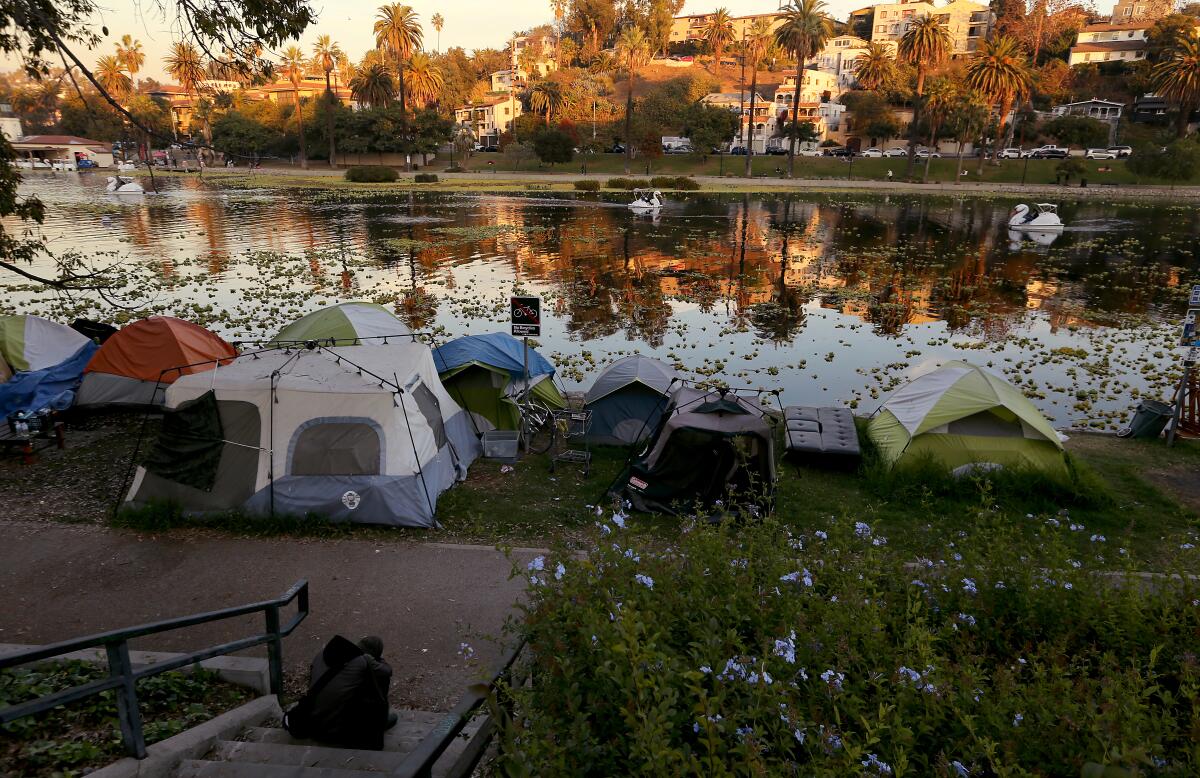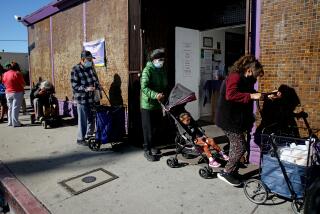COVID-19 job losses will worsen L.A. homelessness by 2023, new report says

- Share via
Massive job losses caused by the COVID-19 pandemic nationwide will leave tens of thousands of low-wage workers without homes over the next three years, a report published Tuesday by a Los Angeles-based research group forecasts.
Los Angeles County, already struggling with one of the nation’s largest homeless populations, will be especially hard hit, on a per-capita basis, because of its large low-wage labor force and high housing costs.
Based on the effects of the 2008 recession, the Economic Roundtable report “Locked Out” concludes that pandemic-related unemployment will start a brutal cycle of homelessness. It says the uptick began as a trickle in 2020, but will triple this year and peak by 2023.
By then, the number of additional working-age adults with no place of their own to sleep will reach more than 52,000 in Los Angeles County, 131,000 in California and 600,000 across the nation, it said. The most recent federal estimate, for 2019, estimated there were 568,000 homeless people nationally and 129,000 in California. The 2020 count for Los Angeles County put the number at just over 66,000, meaning the projection is for a near doubling.
The majority will remain largely invisible, “couch surfing” with friends or relatives. But for many, that will be the beginning of a path leading to the streets.
A rise in deaths of homeless people is being driven by drug overdoses involving fentanyl, a report by L.A. County public health officials concludes.
The analysis forecasts an increase in Los Angeles County of about 14,000 chronically homeless people — those who both have a disability and have lived on the street for more than a year — roughly doubling the current number.
The dire outlook reflects the types of jobs most affected by the pandemic — those held by low-wage and underemployed workers in retail stores, restaurants and bars, clerical jobs, child care, personal care and, surprisingly, in nonprofit institutions.
“We peel back layers of risk,” said Dan Flaming, president of the Economic Roundtable. “Who are those people? Young, less educated, doesn’t help if you’re an African American or a woman.”
Flaming said the findings support additional spending and new policies at the federal, state and local levels.
“We’re not winning that battle,” Flaming said. “Maybe it’s time to start trying some new game plans.”
More taxpayer dollars are being spent on homeless housing and services, yet homelessness in Los Angeles County increased 12% last year and chronic homelessness is up 17%.
Noting President-elect Joe Biden’s support for new stimulus money, Flaming said relief should be focused on “lower-income tenants and smaller landlords, who have the least resources to weather the crisis and therefore are at the greatest risk of eviction and foreclosure.”
One way to do that, Flaming said, would be an infrastructure bill. Besides building something society needs, it could help lift the underemployed with apprenticeships.
The report also endorses standard proposals for government help: a minimum wage to support basic necessities, more federal funding for programs that fund housing construction for homeless people, local reform of land-use regulations, legal representation for all tenants facing eviction and full funding of the federal Section 8 rental assistance program.
Even before the pandemic pushed more people into poverty, federal rental subsidies were available for only about 1 in 4 Los Angeles County households that qualified under the income guidelines.
“This unreliable allocation of funds is cruel and arbitrary, making it impossible for low-income families to find the stability and affordability that they need to manage their finances,” the report said.
It also endorsed a practice, used in cities such as Atlanta and Cincinnati, allowing tenants to buy insurance in place of security deposits to spread the cost over several premium payments.
The Economic Roundtable, which spun off as a unit of Los Angeles County, is a nonprofit research organization that analyzes demographic, economic, housing and environmental data to support public policy.
To probe the effects of the anticipated job losses on homelessness, the Economic Roundtable took data about the 2008 Great Recession from the U.S. Department of Labor, the California Employment Development Department, the Los Angeles County Department of Social Services, the census and the annual homeless count, and calculated that one person became homeless for every 10.3 people who lost their jobs. But homelessness trailed unemployment, continuing to rise several years after the recession ended.
“People are likely to fend off homelessness as long as possible by forgoing other expenses, relinquishing assets and going into debt in order to remain housed,” the report said. “However, without money to pay for rent or a supportive social network, it is likely that individuals will be evicted and lack a place of their own to sleep.”
More to Read
Sign up for Essential California
The most important California stories and recommendations in your inbox every morning.
You may occasionally receive promotional content from the Los Angeles Times.












